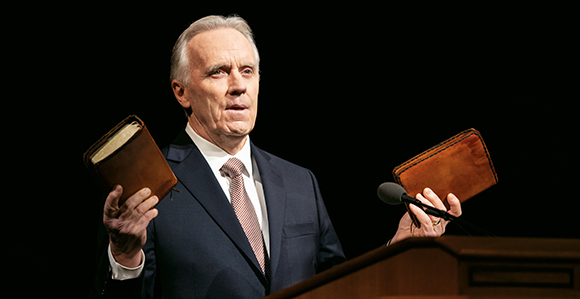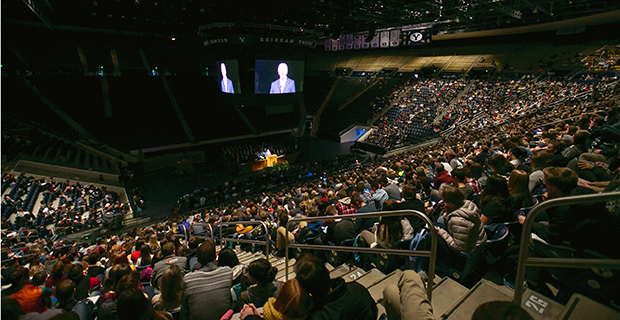Answering Primary Questions about the Church Closes Gap between Belief and Truth
Contributed By Valerie Johnson, Church News staff writer

Elder Lawrence E. Corbridge, General Authority Seventy, speaks during a BYU devotional on January 22, 2019. Photo by Gabriel Mayberry, BYU Photo.
Article Highlights
- Is there a God who is our Father?
- Is Jesus Christ the Son of God, the Savior of the world?
- Was Joseph Smith a prophet?
- Is The Church of Jesus Christ of Latter-day Saints the kingdom of God on the earth?
“Knowledge is crucial to avoid deception and discern between truth and error.” —Elder Lawrence E. Corbridge of the Seventy
Related Links
Will you stand forever? Or will you go away?
These are questions Elder Lawrence E. Corbridge asked BYU students to ponder during his devotional address on January 22.
As part of an assignment as a General Authority Seventy, Elder Corbridge needed to read through a great deal of material antagonistic to the Church, the Prophet Joseph Smith, and the Book of Mormon.
“There may not be anything out there [of that nature] I haven’t read,” he said.
Reading this material always left him with a sense of gloom, which inspired him to write a response to these antagonistic claims.
The kingdom of God is The Church of Jesus Christ of Latter-day Saints, as described in the book of Daniel as standing for ever.
“The question is, will you and I stand?” Elder Corbridge said.
Now is a day where deception is everywhere, and the spectrum of deception is broad. It ranges from attacks on the Restoration, Joseph Smith, and the Book of Mormon to those who claim to believe in the Restoration but are disillusioned with doctrine that conflicts with shifting attitudes of the day.
“Truth enables us to see clearly because it is the knowledge of things as they really are, as they were, and as they are to come,” Elder Corbridge said.
One cannot be better than what he or she knows. Most people act based on their beliefs. Sometimes, though, their beliefs are wrong.
For instance, someone may believe in God and that pornography is wrong, yet still clicks on a site, wrongly believing he or she will be happier, cannot help but click, isn’t hurting anyone else, or it’s not that bad. But this person is wrong.
“When you act badly, you may think you are bad when in truth you are usually mistaken,” Elder Corbridge said. “The challenge is not as much closing the gap between our actions and our beliefs. The challenge, rather, is closing the gap between our beliefs and the truth.”
So how does one close that gap?
Answer the primary questions first
Elder Corbridge explained there are primary and secondary questions when it comes to the Church. The primary questions must be answered first, as they are the most important. They include:
- Is there a God who is our Father?
- Is Jesus Christ the Son of God, the Savior of the world?
- Was Joseph Smith a prophet?
- Is The Church of Jesus Christ of Latter-day Saints the kingdom of God on the earth?
In contrast, the secondary questions are unending. They include questions about Church history, polygamy, blacks and the priesthood, women and the priesthood, how the Book of Mormon was translated, DNA and the Book of Mormon, gay marriage, different accounts of the First Vision, and so on.
“If you answer the primary questions, the secondary questions get answered too, or they pale in significance, and you can deal with things you understand and things you don’t understand, things you agree with and things you don’t agree with, without jumping ship altogether,” Elder Corbridge said.
There are three major methods of learning—scientific, analytical, and academic—but the divine method of learning incorporates elements of the other methodologies and “ultimately trumps everything else by tapping into the powers of heaven,” Elder Corbridge said. All four methods are necessary to know truth.
Scientific method
With the scientific method, one forms a hypothesis in response to a question. Experimentation is then conducted to test the hypothesis. “The results are then analyzed, and conclusions are drawn that either confirm, disprove, or modify the hypothesis, in which event the process continues,” Elder Corbridge explained.
Alma issued an invitation to “experiment upon [his] words” (Alma 32:27). In regard to tithing, the Lord said, “Prove me now herewith, … if I will not open you the windows of heaven, and pour you out a blessing, that there shall not be room enough to receive it” (Malachi 3:10).
“Truth can be discovered by doing, which is faith,” Elder Corbridge said. “Experience plays a vital role in coming to know the truth.”
Analytical method
The analytical method involves gathering, organizing, and weighing evidence relevant to a question. Based on the weight of the evidence, conclusions are drawn as to what the truth may be, he said.
For instance, the Lord instructed Oliver Cowdery in Doctrine and Covenants 9:8, “But, behold, I say unto you, that you must study it out in your mind; then you must ask me if it be right.”
“Evidence and reason also play a role in preparing us to know the truth,” Elder Corbridge said.
Academic method
The academic method involves study of the written word.
The prophet Mormon said in Alma 31:5 that the word of God has a more powerful effect upon the mind than the sword or anything else.
Holding up a set of scriptures, Elder Corbridge told students gathered in the Marriott Center, “This is more powerful than fear, addiction, pornography, or anything else.”
Divine method
The divine method of learning incorporates the other three methods and taps into the powers of heaven. “Ultimately the things of God are made known by the Spirit of God, which is usually a still, small voice,” Elder Corbridge said.
The best of all human conditions in this life is to have the gift and companionship of the Holy Ghost.
“Pay whatever price you must pay, bear whatever burden you must bear, make whatever sacrifice you must make in order to get and keep in your life the Spirit and power of the Holy Ghost,” Elder Corbridge said. “Everything depends on that.”
The gloom that came while reading so much material antagonistic to the Church did not come as the result of belief bias or the thought that everything he once believed could be wrong. Rather, “the gloom I experienced as I listened to the dark choir of voices raised against the Prophet Joseph Smith and the Restoration of the Church of Jesus Christ … is the absence of the Spirit of God,” Elder Corbridge said.
Revelation from the Spirit of God supersedes belief bias because it is not premised only on evidence.
“I don’t know much, but I do know the voice of the Lord, and His voice is not in that dark choir, not at all in that choir.”
In contrast to that gloom and stupor of thought, the Spirit of light, intelligence, peace, and truth attends the events and doctrine of the Restoration, especially the scriptures revealed through Joseph Smith.
“Just read them and ask yourself and ask God if these are the words of deceit, delusion, or truth.”
There are some members of the Church who don’t know the answers to the primary questions, and they spend their time and attention slogging through the secondary questions.
“They mistakenly try to learn the truth by process of elimination, by attempting to eliminate every doubt,” Elder Corbridge said.
One cannot prove the Church is true by disproving every claim made against it. Ultimately, there must be affirmative proof. With the things of God, that affirmative proof comes by revelation through the Spirit of the Holy Ghost.
“The Church of Jesus Christ is grounded on the rock of revelation, and the gates of hell shall not prevail against it,” Elder Corbridge said. “[Although] we may not know the answer to every question, we must know the answers to the primary questions, and if so, the gates of hell shall not prevail against us and we will stand forever.”

Elder Lawrence E. Corbridge, General Authority Seventy, speaks during a BYU devotional in the Marriott Center on January 22, 2019. Photo by Gabriel Mayberry, BYU Photo.
